Ghana
Published on Mon, 2013-09-30 19:19
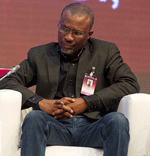
Tetteh Hormeku
|
Third World Network-Africa (TWN Africa) has punched holes into the revised Ghana Investments Promotion Centre (GIPC) Bill, noting that there has been little change to the provisions.
According to the non-governmental organization, the changes in the provisions did not offer any relief for domestic producers.
|
|
Source: 
. Published on Mon, 2013-09-16 00:00
|
Published on Thu, 2013-08-15 21:56
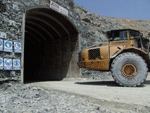
Ahafo Mine at Kenyasi, in
Asutifi District. (Photo:
Ghana’s Mining Portal)
|
The commodity dependence of most African countries has intensified, despite claims of remarkable economic performance in recent times, Dr Yao Graham, Coordinator of the Third World Network Africa, has said.
Addressing participants at the 14th Review and Strategy Conference of African Initiative on Mining Environment and Society (AIMES), Dr Graham said amidst the deafening rhetoric that Africa is rising; most countries on the continent continue to reel under unfavourable economic conditions.
“The economies of most countries on the continent are fragile and this is going side by side with the deafening rhetoric that Africa was rising,” he said, at the opening session of the conference.
|
Published on Fri, 2012-12-14 08:38
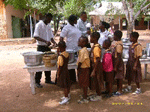
School lunch in Ghana
(Photo: Ndcuk.org)
|
The lack of political will seems to be the main obstacle on Ghana’s road to development and human well-being, but it is not the only one, according to the contribution from civil society organizations of this West African nation to the Social Watch Report 2013.
Ghana has walked a long way towards poverty eradication, food security and education to all, but not all the people have access to medical services, and not all pregnant woman benefit from free health care, so maternal mortality remains very high, aggravating the endemic gender inequities. With this social landscape as a backdrop, the economy experiences a sustained growth, notes the report.
|
|
The lack of political will seems to be the main obstacle on Ghana’s road to development and human well-being, but it is not the only one. This West African country has walked a long way towards poverty eradication, food security and education to all. But it can not provide yet medical services to all the population and free health care to all pregnant women, so maternal mortality remains very high, as gender inequities. In the meantime, the economy experiences a sustained growth.
|
Published on Tue, 2012-08-28 15:00
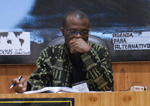
Tetteh Hormeku of TWN-A.
(Photo: Transnational
Institute/Flickr/CC)
|
The Economic Justice Network (EJN), a Ghanaian coalition of civil society organizations working for socio-economic justice and equitable national development, was re-launched to deal with new policy threats affecting livelihoods, reported Ghana News Agency and AllAfrica news portal.
|
Published on Wed, 2012-08-01 08:37
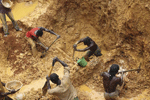
Small-scale gold miners in
Obuasi, Ghana. (Photo: George
Osodi/ Africa Renewal/Panos)
|
Obuasi, about 200 kilometres northwest of Accra, Ghana’s capital, is home to one of the richest gold mines in the whole world. For more than a hundred years the precious metal mined there has been taken to jewellers in the West and beyond, earning millions of dollars for mining companies and their shareholders, wrote journalist Efan Dovi Africa Renewal magazine, published by the United Nations.
|
Published on Fri, 2012-03-16 10:13
In terms of gender equity Ghana places itself above the Sub-Saharan African average, and also in a better condition than its three neighbours.
|
Published on Mon, 2012-02-20 10:05

Ahafo Mine at Kenyasi, in Asutifi
District.
(Photo: Ghana’s Mining Portal)
|
Three months after the announcement of an increase in corporate tax for mining companies from 25 to 35 percent in Ghana, the raise is yet to be implemented. The tax may not be collected until 2013, according to TV3 television channel. “The attitude of government gives reasons to believe that it will yield to pressures from the industry,” wrote Alhassan Atta-Quayson, expert of Third World Network-Africa (TWN-A).
|
|
Addressing climate change is critical for sustainable development in the country. At the national level, efforts have been made to comply with the decisions of the United Nations Framework Convention on Climate Change (UNFCCC), but bilateral and multilateral funding opportunities affect the extent to which the real concerns of citizens are addressed. Donor consultations on adaptation and mitigation of climate change are constrained by a neo-liberal economic framework that limits the space for a citizen-led process. Civil society organizations must intensify efforts to ensure that efforts to address climate change promote social justice, human security, gender equality, and sustainable development.
|
SUSCRIBE TO OUR NEWSLETTER
Submit

|








